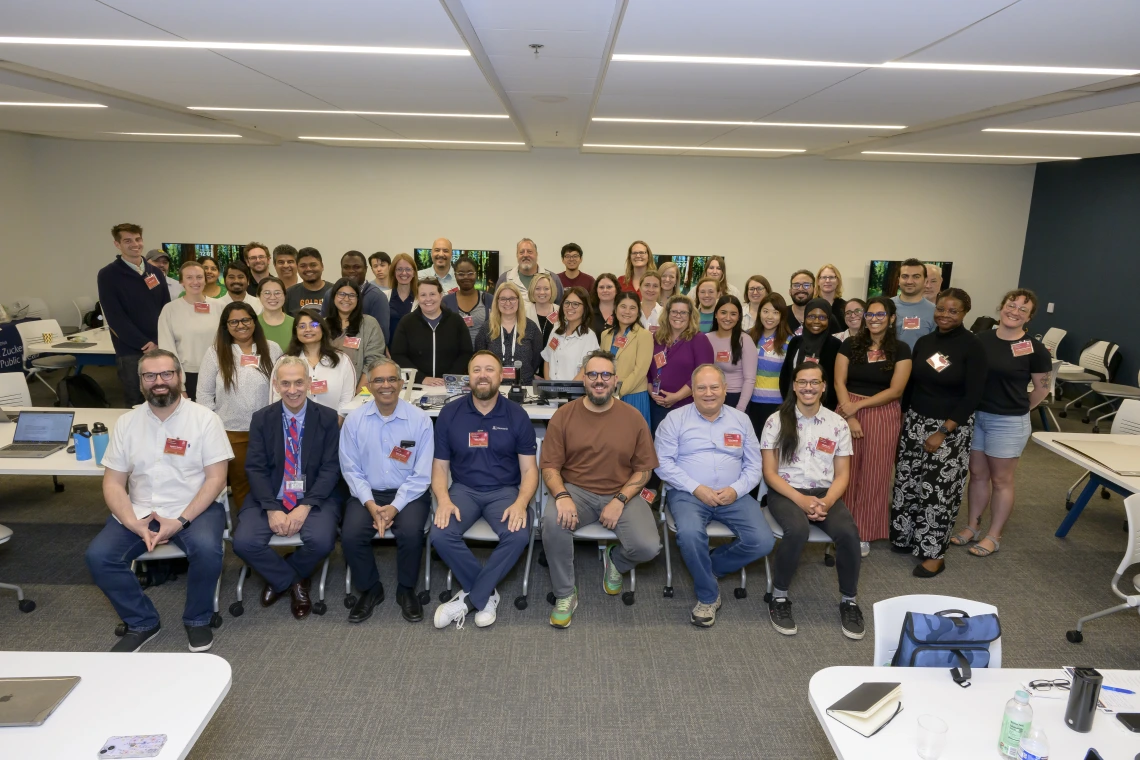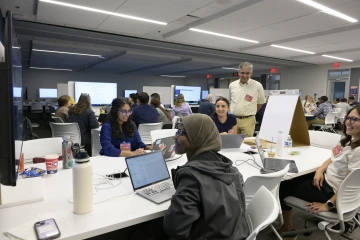DSI helps to make the grade at Public Health and AI Summer School

The first Public Health and AI Summer School at the University of Arizona brought together faculty, staff, and industry leaders for four days of focused workshops exploring AI in the context of public health. The program hosted 52 participants and generated global interest. The overwhelming response confirmed a growing need for this kind of public health training.
The summer school covered foundational and advanced concepts including digital epidemiology, machine learning, generative AI, digital biomarkers, and ethical considerations. Sessions offered practical exposure to AI tools for data management, visualization, spatial epidemiology, and scientific literature review. The interactive makerspace activities gave participants the opportunity to apply what they learned. Many participants entered with little or no experience and left with foundational knowledge and even prototype projects.
Onicio Leal Neto, PhD, MPH with the U of A Mel and Enid Zuckerman College of Public Health (MEZCOPH) played a central role in the success of the program as the lead speaker during various sessions, handling general coordination, content and graphic design, hosting, and curriculum development. He was joined by experts from the U of A Data Science Institute (DSI), whose contributions helped shape the curriculum, brought critical AI technical skills to the presentations, discussions, and hands-on training, and supported participants throughout the workshops.
According to Neto, “DSI played a crucial role in the success of the summer school by providing the technical expertise and computational perspectives that only a computer science-focused team can offer. At the same time, DSI demonstrated a strong understanding of the importance of the public health domain, ensuring that space was given for public health practitioners to articulate their demands, needs, and expectations. This balance between advanced technical insight and domain sensitivity enabled the program to be truly interdisciplinary and responsive to real-world public health challenges.”

Kris Hanning
Nirav Merchant, Director of the Data Science Institute, provided insightful commentary as he sat on the panel, Future-ready Public Health – AI-Powered Modernization, with Theresa Cullen the Pima County Public Health Director and Susan Robinson the Chief Business Intelligence Officer at the Arizona Department of Health Services. Other session leaders including Marvin Slepian, M.D., Shravan Aras, Carlos Lizárraga, Enrique Noriega, Michele Cosi, Megh Krishnaswamy, Tyson Swetnam, and Sameer Halai with Wehealth offered a broad range of expertise.
Feedback from the summer school participants identified three areas of standout value: AI literacy emerged as the most impactful component; sessions linking digital public health with real applications helped participants grasp how AI already influences public health strategy; and the interest in generative AI reflected its broad potential for improving communication, research workflows, and data analysis.
Despite the program’s success, organizers recognized challenges as they plan for the future. Participants brought a wide range of experience levels, which created moments of mismatch content depth. To address this, the next summer school edition could likely divide participants into groups based on background knowledge. A hybrid format is also under consideration, allowing remote participation and greater accessibility. The goal is to provide practical skills while building stronger connections between the technical and public health communities.
Neto emphasized, “I strongly believe that public health researchers and practitioners should take on the role of critical thinkers, not just users of AI tools,” he said. “We’re entering a moment where our domain expertise and training are crucial, not only for informing technical assumptions, modeling, and application design, but for shaping the overall direction of AI development. When public health perspectives are combined with computer science expertise, we can bridge the gap between generalization and real-world realism, ultimately driving more consistent and impactful applications for society.”
The summer school reflects the U of A's commitment to integrating AI into public health. Dr. Iman Hakim, MEZCOPH Dean, noted that the goal is to train public health professionals to use AI ethically and effectively and to equip them to improve lives in all communities.
Read more in the U of A News article, College of Public Health launches AI summer program.

